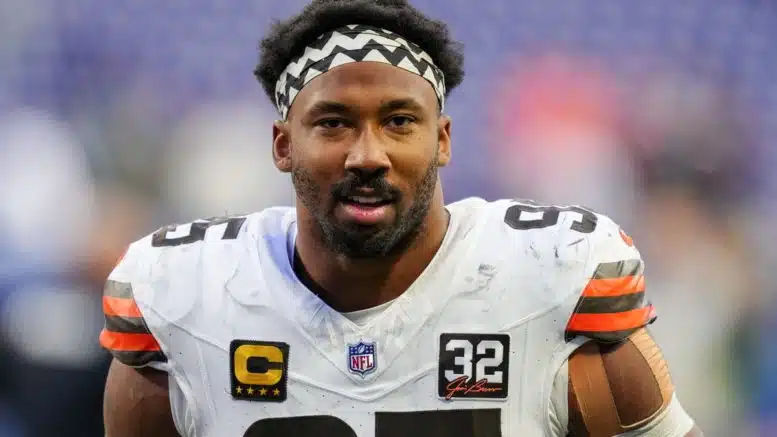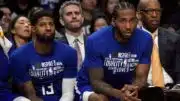Anybody else hear that? It’s the sound of NFL owners shaking in their boots.
I know, it’s a drastic hyperbole, but if you don’t think that the cartel that runs the country’s most popular and profitable sports league has a unique cause for concern after the news broke yesterday that one of its biggest stars, Cleveland Browns menace of a pass rusher Myles Garrett, bought a minority stake in his city’s NBA franchise, the Cleveland Cavaliers, let me walk you through it.
The Cavs tweeted yesterday that Garrett had joined its ownership group, and while it didn’t provide any financial details, The Athletic followed up with the detail that over the summer, the NBA had reduced the minimum equity stake required for minority owners in teams to a half-percent of the team. That’d put Garrett’s cost to entry at somewhere between $8.25 million and $9.75 million, based on the value Forbes ($1.65 billion) or Sportico ($1.95 billion) put on the Cavs — a comfortably affordable investment for the Browns’ second-highest earner.
But the numbers, straightforward as they are, aren’t the thing that should make NFL owners squirm. What is is who’s definitely watching that development and guaranteed to factor into their thinking going forward. At the top of that list is Caleb Williams, the USC quarterback and expected No. 1 pick in the 2024 NFL Draft. Just a week ago, it was rumored that other than his CBA-limited rookie contract, Williams wants an equity stake in whatever NFL team drafts him. That speculation was widely — and somewhat rightfully — dismissed since the same collective bargaining agreement that will put a cap on Williams’ rookie deal also puts limits on other types of compensation to players that would seem to limit the ability of a current athlete from owning a piece of the team they play for.
It makes sense, since it’d be an odd position for any team’s quarterback to have a say in, something like how much an underperforming O-lineman or his favorite receiver might make on their next contract. It’s a scenario that makes locker room politics get really sticky, real quick. But let’s use our imaginations: even with rules that put rational limits on player ownership, it’s also worth recognizing who those rules benefit the most (the owners) and who stands to gain the most by building a case for tearing them down (players). The NFL Players Association is regarded as the weakest in American team sports for its ability to win concessions on player compensation, insurance, and the overall power of athletes-as-employees compared with owners. Any attempt from a single player — let alone a high draft pick with the potential to become a superstar player in the league — threatens, however slightly, a maneuver to loosen owners’ grip on the reins. And maybe the only thing NFL owners fear more than players grabbing for more power and compensation is the ever-looming idea of their cartel buckling under the weight of an antitrust investigation or lawsuit.
The question here is if Williams really is committed to the idea of having a piece of the NFL pie for himself, how far would he be willing to go to make that argument? Sure, it’s far-fetched that a guy who hasn’t played a down in the NFL would consider something like litigation to try to join the ranks of his would-be new employers as a colleague. But it’s also worth considering that Williams is a member of a generation that has watched NFL owners use their power not only in their own financial interests but also to tamp down on dissent from players (see: Kaepernick, Colin, and the league’s many and still-simmering controversies over race). The NFL is still being sued by some current coaches over alleged racial discrimination and it acknowledged directly that even it recognizes the need to diversify the ranks of its ownership suites last summer when it released a vague statement that read, in part that, “The membership will regard it as a positive and meaningful factor if the group includes diverse individuals who would have a significant equity stake in and involvement with the club, including serving as the controlling owner of the club.”
By definition, becoming a person with a “significant equity stake” in an NFL team certainly means being a millionaire, and what better place to find a diverse pool of millionaires interested in having a significant stake and involvement in an NFL team than its pool of mostly Black, millionaire players. Beyond that, Williams is also part of a generation that’s watched a boom in off-field wealth creation from players — most notably LeBron James, about whose focus on gobbling up equity in companies rather than accepting mere endorsement deals.
I edited an entire issue of the ill-fated ESPN the Magazine a decade ago. James became the blueprint for athletes of his generation and those to follow. His insistence on being part of the big decisions, sharing in the profits, and picking the brains of capitalist gods from Warren Buffett to John Henry begat Patrick Mahomes and his stake in the Kansas City Royals and MLS’ Sporting Kansas City, and it arguably begat Garrett’s interest in ownership in James’ former team, the Cleveland Cavaliers. Viewed through that lens, Williams’ rumored thought process around equity gets harder to laugh at. If you don’t think a kid with this much talent and earning potential is thinking less in terms of a mere rookie and more along the lines of looking out for his own best interests–and watching Garrett, Mahomes, James, and others to see how they move, I’ve got a stake in an NFL team I’m willing to sell ya.
Original source here
#Caleb #Williams #watching #Myles #Garrett #buying #Cavs





